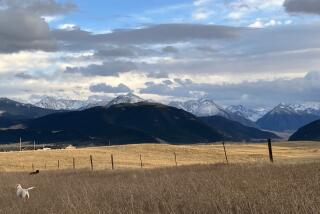Banished to the Great Northern Culture Swap : EXILE IN ALASKA <i> by John Mitchell (Plover Press: $13.95</i> ,<i> cloth; $8.95, paper; 113 pp.)</i>
Exile in Alaska: The phrase conjures images of frozen wastes, the long dark and solitude of the far north. In these seven stories, however, exile refers to a subtle force that is pervasive in the lives of many who choose the last frontier, a force by which each is measured and sorted.
This is John Mitchell’s second book of stories from the fishing grounds and homesteads of the 49th state. The Alaska he chronicles is primarily one of people rather than wilderness. We stay close to the fishing boats, roads and airports--which remain closer to wilderness here than in most places.
This is a boon for those curious about the ways of life in this territory, for Mitchell has a talent for casting it just as it can be. He doesn’t traffic in heroes or villains, merely the real-life folk, who in these parts are characters enough.
The author imparts a vividness to character and event with his trademark gifts of well-observed detail and striking metaphor, as in the opening story, “Camera Killer,” in which an unarmed photographer is narrowly missed by a charging bear:
“I gained an indelible impression of that animal’s enormous muscularity as revealed in the crawling of the coat, the clumps of hair changing color in his effort like a field of wheat in a high wind.”
In “Vendaval,” he elucidates the effects of writers aboard fishing boats:
“The crewmen on the Vendaval were lifting their lips ever so slightly, as if the scratching of my pen were like a dentist’s drill and bound to get worse.” And describes his crew mate as: “ . . . so big his clothes reflected light like the side of a building.”
“Sophie’s Short Family History” is a tragicomic portrait of a culture exiled in its own land. Here a native girl recounts the volatility of winter village life:
“Men burning their houses just for spite, dragging their wives home through the snow by the hair. They slide easy.” And shares her people’s resentment of “Gussock” (outsider) rules and regulations:
“In Kodiak, there are so many laws you can’t even turn around. If you don’t believe me, see what happens if you have to lift your leg sometime. . . .”
Mitchell’s knack for the thoughts and dialogue of his subjects is sharp. It is just this sort of description and convincing presentation that earned the Pushcart prize for his first book, “Alaska Stories.”
“Exile in Alaska” is generally of equal quality, but was perhaps groomed with a broader-toothed comb. There are moments within a few selections when the educated voice of the author bleeds through the frontier vernacular or when the sequence of action is muddled.
Several of the stories involve somewhat pathetic characters engaged in struggles of one kind or another. These can be depressing. The ambitious “Child of the Round Calendar,” comes closest to breaching this effect through the humorous broodings of an eccentric cannery worker from California who philosophizes about his problems with his nymphomaniac wife and life in general.
Finally, “Points North” closes the collection with an ironic roadside culture swap. Nine-hundred miles down the Alaskan Highway, a white homesteader in spring exodus to the Lower-Forty-Eight aids a pair of tippling Indians who have mired their urban coupe in a snowbank. While he ponders the implications of the fast food, pomade and beer bombarding his senses, the Indians sniff carefully at this fellow’s rough-clad self-reliance: “You live in an igloo or something?”
Despite some downbeat themes and minor flaws, these stories brought me back to my earliest fishing days in Alaska when encounters with just such people and places were in their first, fresh collision with my preconceptions. It was exhilarating to witness the live capture of those essences in print.
If Mitchell’s sense of exile should ever cause him to head “South” for good, we would be fortunate to be left with these vivid tales. If on the other hand the compelling virtues of this great place continue to override that sense and further stir his considerable talent, that would be even better.
More to Read
Sign up for our Book Club newsletter
Get the latest news, events and more from the Los Angeles Times Book Club, and help us get L.A. reading and talking.
You may occasionally receive promotional content from the Los Angeles Times.






